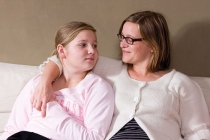
As this guide has shown, opioid misuse can affect the health and well-being of children and teens at a critical point in their lives—when they are growing, learning, maturing, and laying the foundation for their adult years.
As a parent, your children look to you for help and guidance in working out problems and in making decisions, including the decision not to use drugs. Even if you have used drugs in the past, you can have an open conversation about the dangers. Whether or not you tell your child about your past drug use is a personal decision. But experience can better equip us to teach others by drawing on the value of past mistakes. You can explain that there is an opioid crisis in the country and that misusing opioids can have potentially harmful effects on the developing brain.
Tips for Parents
- Be a good listener.
- Set clear expectations about drug and alcohol use, including real consequences for not following family rules.
- Help your child deal with peer pressure to use drugs.
- Get to know your child’s friends and their parents.
- If concerned, have your child evaluated for mental health issues such as depression or anxiety.
- Monitor your child’s whereabouts.
- Carefully monitor your child’s medications.
- Do not leave unused opioids in accessible places in your home.
- Supervise teen activities.
- Talk to your child often.
- Do not ignore signs that your child is changing in negative ways.
Because opioids are available by prescription, many children and teens don’t understand their danger, and even fewer recognize that heroin is an opioid. Many also do not realize that dangerous fentanyl is added to many street drugs. Misusing opioids can be harmful and can alter the course of young peoples’ lives, preventing them from reaching their full potential. That's reason enough to have this difficult conversation with your children. Be certain that the discussion focuses on how much you care about your child’s health.
We hope this guide encourages and helps parents to begin the dialogue and, more importantly, to keep open the channels of communication.
